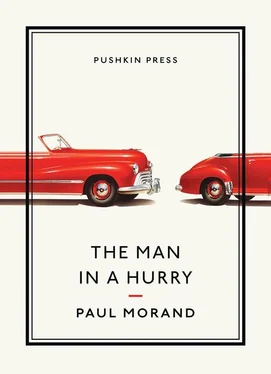“Brutus murdered Caesar because his frenetic behaviour was getting on his nerves and the Senate supported him… and so do I!” yelled Placide.
“Compared to Caesar, the most celebrated conquerors seem to be asleep on their feet,” continued Pierre, not listening to him. “Charlemagne, for example, and his forty-year wars that dragged on like his beard! And those dull Crusader knights who got bogged down in arguments about etiquette, in lawsuits about common ownership, and romantic novels; and those dreary tournaments with sermons one after the other from the heralds-at-arms…”
“You’re not equipped to understand the sturdy and steadfast beauty of armour,” Placide cut in tersely.
“Let us prefer to them, ladies and gentlemen, Henri IV conquering his kingdom unawares, Gustavus Adolphus devouring Europe in a gulp, Condé and his strategic inspiration…”
“Thank you for this brief lesson about famous restless men,” Placide interrupted. “Now, tell me why—”
“—Why the greatest par excellence is Napoleon? Ah, Placide, what frantic pursuits amid the bell-towers and the cannon those Empire wars were! Those volte-faces, those perilous leaps, those pugilist’s counter-attacks that took advantage of the enemy’s slightest loss of equilibrium! The Italian campaign, I tell you, I know it by heart: the dazzling reversal at Montenotte, the scramble at Roveredo, the lightning raid at Bassano, the stunning victory of Marengo, the crossing of the Alps at a canter! Caesar or Napoleon, it’s the same triumph of resourcefulness. They always break out from impossible positions where the old strategy was not expected.”
“Enough!” Placide cries. “For once, I’m the one asking you to be brief…”
“And the French campaign in which the old lion, exhausted, out of breath, his muscles failing, suddenly rediscovers his form, his old determination, that way he had of spinning round that still used to terrify visitors to St Helena who came to ogle at him through the bars of the cage!”
Placide came and stood in front of Pierre and, with a malevolent smile, said:
“These leaders were better at winning battles than hearts: you’re rather like them in that respect.”
“Don’t you like me any more, Placide?”
“No.”
“Are you sulking?”
“The word is poorly chosen, as is everything you choose to do, what’s more,” cried Placide in exasperation.
“I’ve got some good news to give you, however. Aren’t you interested? Listen all the same: the two fourth-century urns and the casket from Oslo with gold coils that you didn’t approve of me buying, well, Baltimore Museum is buying them back from us at a hundred per cent profit.”
“And that’s why you asked me to come here,” moaned Placide, who was beside himself with rage.
“Yes, that’s why I sent for you. And also to tell you that I’m doubling your percentage on it. And also all your percentages on all our business deals, so satisfied am I with the smooth running of our partnership.”
Placide remained speechless, blushing and turning pale alternately.
“What, you’re not pleased?” asked Pierre with a smile.
“No, I am certainly not!” said Placide irritably. “The way you behave is killing me. Do you realize that I almost fainted from surprise! I’m terrified of shocks. Whenever you do something kind for me, you do it so suddenly that it makes me feel angrier than I am when I get a fine! You wake me up with a jolt! You don’t allow me time to get dressed. Not even the time to sleep, or so little that you prevent me from sleeping properly. You don’t actually give me time for anything! I’m your scapegoat. I feel I’m always trying to catch up with you. I need to live normally and not feel cooped up at the back of the train in the role of brakeman. And since I’m here this morning against my wishes, I’m taking the opportunity to tell you that I’m breaking off our partnership and that I’m setting up on my own.”
“Are you serious?” asked Pierre.
He gazed in astonishment at this friend of fifteen years’ standing, in whom he had noticed nothing more than an incomprehensible hostility. He felt like saying: “But what have I done to you?” since he was unable to understand that a mere difference in their respective tempos could fill Placide’s soul with such resentment.
He tried to see things from Placide’s standpoint, to view his own self impartially; what could he be blamed for? A little too much hastiness, verging occasionally — very rarely — on feverish activity. It was a fault, a shortcoming rather, a delightful shortcoming; so many people are lethargic, dead weights who are impossible to shift. In his case, everything was dynamism and lightness. People should, on the contrary, be grateful to him for speeding things up and bringing them to a satisfactory conclusion so quickly.
Placide had calmed down somewhat; he continued dispassionately:
“I need a more temperate climate than yours; you roast, while I need to simmer. Ever since I left the École des Chartes, you’ve been my evil genius…”
“Come now, I’ve been your salvation! I’ve broken you in, I’ve given you a flick of the whip when you needed it. Without me, would you have ever left your Mama for a single meal?”
“You’re right there, you’ve disrupted my dearest habits; you’ve jostled me, you’ve hypnotized me! You were never in the least grateful for the lessons you attended at my school, because the good antique dealer, the artistic antique dealer, is me and not you; you’ve got a nose, that’s all.”
“My dear Placide, I’ve never disputed any of your great virtues, but you do have a few small faults: you’re meticulous, fussy, cautious, circumspect; admit that without me you would have daydreamed your life away… don’t you think?”
“I don’t intend to continue this discussion,” said Placide very curtly, “let’s just say that we’re divorcing due to incompatibility of temperaments. At Saint-Vallier, when we had that accident and after you had almost killed me, you left me on my own all night in your abandoned car by the banks of the Rhône; I was already so furious that I’d decided never to see you again. I felt sorry for you and I changed my mind, but since then your frantic express-train frenzy has only got worse. As in the meantime an international association of antique dealers has been set up in Rome and I have been asked to join as an expert on Gothic art, I’ve accepted. Does that vex you?”
Pierre considered the matter:
“No,” he said. “Better that than you blaming me later on for not allowing you to try your luck.”
“As you can see, I am delighted by this ready agreement,” said Placide, who was feeling both offended and consoled, for he had feared rather more resistance. “No hard feelings, dear fellow, no hard feelings, my slippery old eel!”
And he went out giving an affected little wave.
Pierre was left alone gazing at the ceiling for a while. He was thinking of the way in which he would reorganize his business, without a partner. A great deal of boring work in prospect, assets to be shared out, further funds to be found. He would have to get down to it straight away. For once, his “straight away” did not signify “immediately”, since Pierre did not stir; he even sat down again in his armchair and reflected.
“That idiot has ruined my day!”
His bad mood filled him with unpleasant images. In his mind’s eye he thought about the evening before last with the two girls that had begun so happily and ended so gloomily. What could have cast such a spell on him?
He kicked his chair away and rang for Chantepie, who did not come. He rang again. The sound of the bell, which failed to activate the late, limping arrival of the elderly servant, grew mournful. It was like a stone falling into a well. Pierre opened the doors and shouted:
Читать дальше












